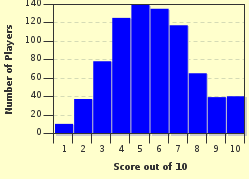Quiz Answer Key and Fun Facts
1. Who was US President at the start of the 'Great Depression'?
2. Who took over as Luxemburg's head of state in October 2000?
3. What was the first name of waxworks creator Madame Tussaud?
4. Which of the following methods of public transport carried its first passengers in 1863?
5. In the early 17th Century, Galileo Galilei discovered the four moons which are still known today as the 'Galilean Moons'. Around which planet do they circle?
6. Which war between Athens and Sparta lasted from 431-404 BC?
7. John F Kennedy was the eighth US President to die whilst in office. Four of these were assassinated. Three of the other four are named below. Which of these survived to serve out his full term?
8. Which of the following English monarchs was the only one to have a coronation?
9. Although his reign began in December 2006, the coronation of the 28 year old King Jigme on November 6, 2008 officially established him as the world's youngest reigning monarch and head of state. Of which country is he king?
10. Who succeeded Augustus as Roman Emperor in 14 A.D.?
Source: Author
EnglishJedi
This quiz was reviewed by FunTrivia editor
bloomsby before going online.
Any errors found in FunTrivia content are routinely corrected through our feedback system.

